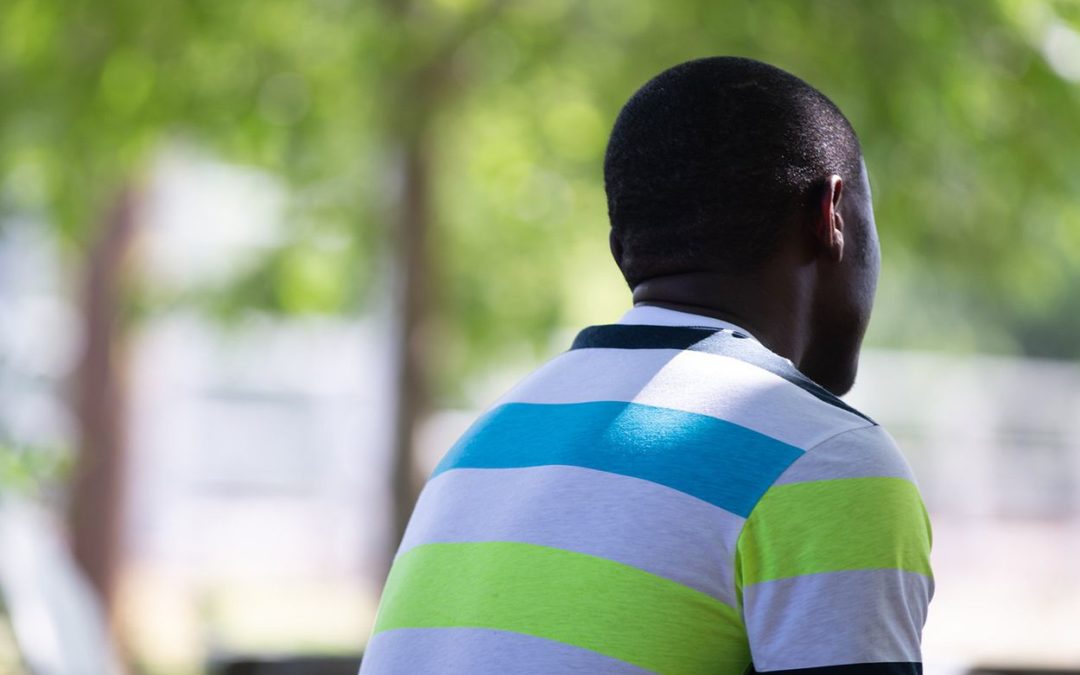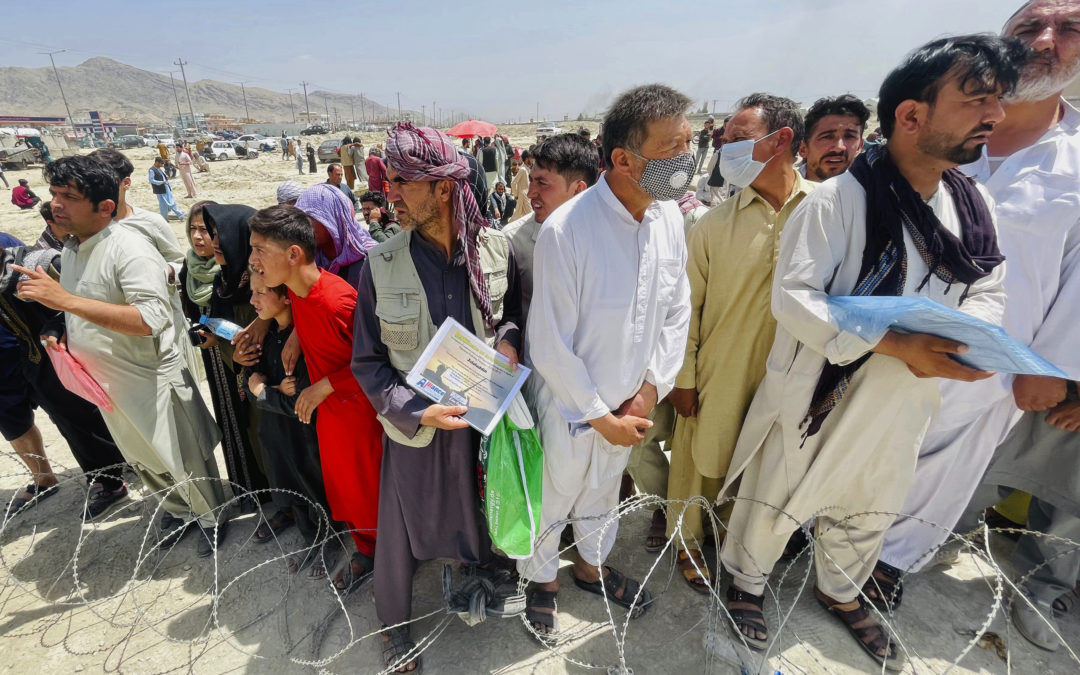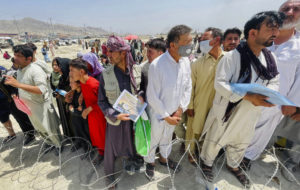by Alejandra Molina, RNS | Jan 12, 2022 | Commentary, Headline News |

LOS ANGELES (RNS) — The Rev. Al Sharpton, speaking at the funeral of the 14-year-old fatally shot by a Los Angeles Police Department officer, recalled coming to Los Angeles 30 years ago to protest the beating of Rodney King by police.
“We keep seeing LAPD get it wrong. And here we are again. How long will it take for you to get it right?” Sharpton asked.
Valentina Orellana Peralta was with her mother, Soledad Peralta, on Dec. 23 in the dressing room of a Burlington clothing store in the San Fernando Valley’s North Hollywood neighborhood when, according to news reports, LAPD officer William Dorsey Jones Jr. fired at a 24-year-old man identified as Daniel Elena Lopez, who had been assaulting a woman in the store. The officer’s shots killed Lopez, and Valentina was also killed when one of the bullets went through a wall.
Both the girl and her mother had come to the United States from Chile.
Sharpton, on Monday (Jan. 10), eulogized Orellana Peralta, who was displayed in a pink dress inside a flower-draped casket during her funeral at City of Refuge, United Church of Christ in Gardena, near Los Angeles.
Today I’m eulogizing 14-year-old #ValentinaOrellanaPeralta who was killed by a LAPD stray bullet as she shopped for a Christmas dress. I’m praying for her parents and loved ones and we will seek justice in her name
 @rachelnoerd pic.twitter.com/NPyYj3lDhu
@rachelnoerd pic.twitter.com/NPyYj3lDhu
— Reverend Al Sharpton (@TheRevAl) January 10, 2022
“There is nothing normal about shooting so recklessly that a young teenage girl looking to live the American dream, that was shopping with her dear mother Soledad, possibly getting a Christmas dress, ends up being dressed for her funeral,” Sharpton said. “This could have been my daughter. This could have been your daughter.”
The shooting made international news when President Joe Biden called Chilean President-elect Gabriel Boric to congratulate him on winning his country’s election and during that conversation, “offered his deep condolences to the people of Chile for the tragic death” of Orellana Peralta.
Orellana Peralta was remembered as a happy teen who excelled in school, who was an advocate for animals and who yearned to become a U.S. citizen. Her father said she had dreams of becoming an engineer to build robots.
Sharpton, during the eulogy, said it was important to make it clear that “we don’t just fight for our own because we all are our own,” Sharpton said.
“Whether you are from South Central, Harlem, or Chile, right is right … If we call for justice for some, we must call (for) it for all, and I wanted to come 3,000 miles to say, ‘Justice for (Valentina)!’” Sharpton proclaimed.
Added Sharpton: “There are those … around America that talk about refugees coming to America, some from Chile, some from Central and South America, some from Mexico, and they ask me why I stand and fight for them to have rights. I fight for them to have rights because I worship a refugee from Bethlehem.”
“Jesus was a refugee, and you cannot despise refugees and then stand up and say you are a believer in Christ,” he said.
The Associated Press contributed to this report.

by Bob Smietana, RNS | Jan 11, 2022 | Commentary, Headline News |
MILWAUKEE (RNS) — Asher Imtiaz is the kind of person who always seems to be wandering into a great story.
Like the time in 2017, when the Pakistani American computer scientist and documentary photographer walked into a Target in Nebraska and ended up being invited to a wedding thrown by Yazidi refugees from the Middle East.
Imtiaz had gone to Nebraska to shoot pictures of life in small-town America in the age of Trump, far from the country’s urban centers. Among his portfolio from the time is another Yazidi family, dressed in patriotic garb and heading to a Fourth of July picnic.
“I went to see America and found these new Americans,” said Imtiaz at a coffee shop on the north side of Milwaukee last year.
Imtiaz fits right in at Eastbrook Church, a multi-ethnic congregation where he serves as a volunteer leader at an outreach ministry for international students at the University of Wisconsin-Milwaukee campus nearby.
Eastbrook is a bit of an outlier these days, a place where refugees, immigrants and international students are welcome at a time when American evangelicals are increasingly suspicious of newcomers to the United States.
According to data from the Public Religion Research Institute’s Immigration Policies Survey, nearly 6-in-10 (59%) white Evangelical Protestants agreed with the statement “Immigrants are invading our country and replacing our cultural and ethnic background.” By contrast, only 31% of Americans overall agreed with that statement.
At an outdoor service at Eastbrook in August, Imtiaz wandered through the congregation greeting friends and exchanging hugs as a diverse worship team led the congregation through a mix of traditional and contemporary songs. The service started with the singing of the traditional Doxology, which begins, “Praise God from whom all blessings flow,” followed by songs like “You Are Good” and “Way Maker,” by Nigerian gospel singer Sinach.
That was followed by a reading of Psalm 23 in English, Spanish and Yoruba.
The church was founded in 1979 by members of Elmbrook Church, a megachurch about 20 miles to the west. Elmbrook’s then pastor was hoping to get church members more involved in the communities where they lived. Dubbed Eastbrook, it was led for three decades by former missionaries Marc and Nancy Erickson. For the past 11 years the pastor has been Matt Erickson (no relation).
The proximity of the university campus led to an intentional outreach to college students, especially those from overseas, which continues four decades later.
Every fall, church members give tours of Milwaukee to newly arrived international students, who are then invited to have dinner at the homes of church members. Many of those students come from Christian backgrounds and are seeking to connect with a church, said Imtiaz, who was raised as an Anglican in Pakistan, a country where only about 2% of the population is Christian.
Those students are also looking for friendship. Imtiaz pointed to a 2012 study of international students in the South and Northeast, which found that 40% of those students had no close friendships with Americans. Through the outreach at Eastbrook, their students often make friends in their first days in the country. Many of them end up spending holidays with church members and making longtime friendships.
“It’s basically providing a home away from home,” he said.
The church also operates an International Community Center on the south side of the city, where a number of recent refugees and other immigrants have settled. The center teaches English as a Second Language classes and provides support with issues like housing and education. About 30 people will end up dropping by the center most days, Dan Ryan, senior director of mission at the church, said in an interview in early January 2022.
Ryan said the church is helping resettle some recent refugees from Afghanistan. He understands that some of his fellow evangelicals around the country are resistant to the idea of resettling refugees. Since refugees are here in the States, he said, churches need to reach out in love.
“Yes, have your political ideas,” he said. “But don’t lose sight of the people involved.”
Ryan said that the church and the center are very open about the Christian motivations for their outreach efforts. But they also steer clear of proselytizing. Their main goal, Ryan said, is to show love and welcome to their new neighbors, a point echoed by Matt Erickson.
“It’s a ministry of care and concern and tangible ways of loving people welcoming people,” he said.
“These folks are treasured by God and valuable in his sight,” said Erickson, who spent several years on the staff of World Relief, a Christian organization that helps resettle refugees in the United States.
While he’s not shy about talking about faith, Imtiaz doesn’t see himself as a “Christian photographer.” He said that Christians in the United States sometimes see their neighbors as “projects” or prospective converts, rather than seeing them as people first. He takes a slower approach, trying to befriend people and see them as a neighbor who is valuable in God’s sight.
As a photographer, Imtiaz practices something he calls “God at ‘I’ level” — trying to connect with the people he photographs as human beings, long before taking their picture.
Like many churches in the United States, Eastbrook has felt the pressure of the country’s political polarization inside the church. Erickson said that Eastbrook has always tried to bring together people from different backgrounds, as task made more difficult by the broader conflicts in American public life over race, politics and increasingly, COVID-19.
He often turns to a verse from the New Testament Book of Galatians, in which the apostle Paul urges his readers to “bear one another’s burdens.”
“The last couple of years have given us lots of opportunities to live that out,” he said. “Sometimes we are doing it well and sometimes we are not. Part of being a body is that we have to learn to talk with each other, and we have to learn how to understand each other.”
During his sermon at the outdoor service in August, Erickson urged church members to ground their lives in the Bible and its message of love, rather than on the noise of the outside world. Without that solid foundation, he said, their lives won’t reflect the kind of love God wants them to share.
“Brothers and sisters, I just want to ask us today, are we giving more time to the news, are we giving more time to social media than we are to the Word of God and letting it sink into our lives?” he said. “I’m not trying to be legalistic. I’m just sick of us being brainwashed and want us to stand in the kingdom.”.
Among the people at Eastbrook that Sunday were Mahitha Voola and Manna Konduri, both originally from India, who came to Eastbrook through the church’s outreach to international students and ended up staying after graduation.
From the beginning, people at the church made them feel at home.
“They say, ‘Oh, taste and see the Lord is good,’” Voola said, quoting a verse from the Psalms. “I’ve tasted that love of God through these people and through the church. I feel very blessed to be part of it.”
The two said they hope to pass on the welcome they have received.
“Today we are the recipients of this love,” Konduri said. “Tomorrow, maybe we will be the ones to show that to someone else.”
Eastbrook’s ethic of welcome, Imtiaz said, has been as much a boon for him as it is for the newcomers.
He’s particularly interested in documenting the story of immigrants and refugees, whom he likes to refer to as “new Americans.” For several years he lived in an apartment complex where newly resettled refugees were living so that he could get to know them. He ended up photographing a number of neighbors after building friendships. When he got COVID-19 — a mild case — one of his former neighbors, a woman from Iraq, would send him soup.
Imtiaz hopes that his photographs and work at the church will inspire people to get to know their neighbors, no matter where they come from.
“If I can go to Nebraska and go to Target and meet 400 Yazidis, anybody else can,” he said.

by Emily McFarlan Miller, RNS | Aug 19, 2021 | Headline News |

Hundreds of people gather near the international airport in Kabul, Afghanistan, Tuesday, Aug. 16, 2021. The U.S. military and officials focus was on Kabul’s airport, where thousands of Afghans trapped by the sudden Taliban takeover rushed the tarmac and clung to U.S. military planes deployed to fly out staffers of the U.S. Embassy, which shut down Sunday, and others. (AP Photo)
by Jack Jenkins & Emily McFarlan Miller (RNS)
WASHINGTON (RNS) — President Joe Biden has authorized an additional $500 million to aid refugees from Afghanistan, pushing through the funds as the White House fends off suggestions it failed a moral test to aid those fleeing the war-torn country.
Biden approved the funds in a memorandum Monday (Aug. 16) to meet “unexpected urgent refugee and migration needs,” drawing the money from the United States Emergency Refugee and Migration Assistance Fund.
The memo, addressed to the U.S. secretary of state, stressed the funds were for “the purpose of meeting … (the) needs of refugees, victims of conflict, and other persons at risk as a result of the situation in Afghanistan.”
The president of Jewish refugee resettlement group HIAS (founded as the Hebrew Immigrant Aid Society), Mark Hetfield, said the move was expected and the fund exists “precisely for this type of situation” — referring to the effort to evacuate Afghans desperate to leave the country after it fell to the Taliban over the past week.
The White House did not immediately respond to questions about how the new funds will be used.
At a news conference Tuesday afternoon, White House press secretary Jen Psaki told reporters that seven C-17 aircraft left Afghanistan over the past 24 hours, carrying 700 to 800 passengers, most of them a “mix” of people from other countries and Afghans seeking a Special Immigrant Visa, or SIV, with the U.S.
Psaki also reiterated the claim that “a good chunk” of SIV applicants “did not take advantage of those visas and depart” before the Taliban took control of Kabul, as the president asserted in his Monday address on Afghanistan — although she did not specify how many.
On Monday, in response to Biden’s address, leaders of several faith-based refugee groups disputed this account, saying they spent months urging the White House to expedite the evacuation of Afghans who aided the U.S. government during its 20-year presence in the country.
“We have been in touch with countless SIV recipients who have been desperate to leave Afghanistan for months and have not been able to due to insufficient financial resources and inadequate flight accessibility through international organizations,” Krish O’Mara Vignarajah, head of Lutheran Immigration and Refugee Service, said on Monday.
Similarly, Hetfield described Biden’s assertion as a case of “blaming the victim.”
Afghan government collapses, Taliban seize control: 5 essential reads
On Tuesday, faith-based groups continued their pressure on the White House to help U.S. allies and other vulnerable Afghans, including Christians and other religious minorities.
Among them, the Evangelical Immigration Roundtable sent a letter to Biden signed by leaders from World Relief, the Council for Christian Colleges and Universities, the National Association of Evangelicals, the Ethics and Religious Liberty Commission of the Southern Baptist Convention and the National Latino Evangelical Coalition.
“As Christians, we believe that each person is made with intrinsic value in the image of God, and we cannot treat any person’s life as expendable. Our government has a particular obligation to those who are now facing threats upon their lives due to their service to the United States, and to go back on our commitment to them would be a moral failing with reverberating consequences for decades to come,” the letter read in part.
Emily McFarlan Miller reported from Chicago.

 @rachelnoerd pic.twitter.com/NPyYj3lDhu
@rachelnoerd pic.twitter.com/NPyYj3lDhu


